Jennie Shortridge's Blog, page 3
October 18, 2012
Recovery
My home was burgled a couple of weeks ago, in broad daylight, apparently by people so desperate for drugs they were willing to climb onto our roof and smash a skylight and windows to get in at 4:30pm on a Saturday. They took precious items, musical instruments and jewelry, the former expensive, the latter not so much. They took our laundry basket to haul their loot. They took my husband's running shoes and my yoga pants and medication out of my bedside table drawer.
And somehow, they didn't take our souls. They didn't get our trust, or our resolve that humans are for the most part a decent bunch. They didn't make us fearful. Their actions were so bizarre and random that we figured we were just the unlucky ones in their path.
Detective Quinones called yesterday to let us know that one of my husband's prized guitars had been located in a pawn shop, the owner there having called them immediately, figuring this guitar was not your average pawn shop item. Detective Quinones plays guitar, and understood how precious this one must have been to us. He told me the long story about the desperate people in the van, who after stealing our things fled and were immediately involved in a hit and run. The vehicle has been returned to its owner (it was stolen, of course), and we will get the guitar soon. We may get our other things, eventually. Most likely not all of them.
But they didn't get anything important. We didn't let them.
And somehow, they didn't take our souls. They didn't get our trust, or our resolve that humans are for the most part a decent bunch. They didn't make us fearful. Their actions were so bizarre and random that we figured we were just the unlucky ones in their path.
Detective Quinones called yesterday to let us know that one of my husband's prized guitars had been located in a pawn shop, the owner there having called them immediately, figuring this guitar was not your average pawn shop item. Detective Quinones plays guitar, and understood how precious this one must have been to us. He told me the long story about the desperate people in the van, who after stealing our things fled and were immediately involved in a hit and run. The vehicle has been returned to its owner (it was stolen, of course), and we will get the guitar soon. We may get our other things, eventually. Most likely not all of them.
But they didn't get anything important. We didn't let them.
Published on October 18, 2012 23:08
August 22, 2012
Addendum/Serendipity
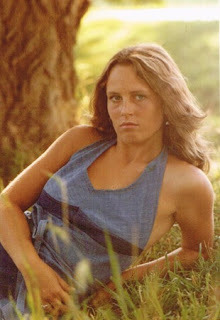
I was looking for a particular photo this morning and to my surprise, found this, the senior photo I mentioned in my last post, the photo that got away. I wanted this one in my year book, but my mother's choice of me smiling like my typical "good girl" self got in. But this, this is who I wanted to be at 17. She still looks a little mysterious and sexy to me, but she also looks challenging and as though she might not suffer fools, and I wonder now if that wasn't really what I was after all along.
Published on August 22, 2012 11:22
August 15, 2012
Hello. It's so good to see you.
Exactly three weeks after I took a tumble and smashed my face into concrete (see previous post) I had to have a new author head shot taken for pre-publicity for my new book (shameless self-promotion: Love Water Memory, out April 2, 2013). Yes, in August I needed a photo of ME for a book not coming out until April.
I'd been postponing with the photographer all three weeks as bruises turned purple, green, then yellow, as road rash scabbed and flaked, as skin beneath came red and angry to the surface. As swelling subsided. As my wounded self regained confidence.
When I was a tiny kid, two, three-ish, I became desperately frightened of cameras, of the flash bulbs, particularly. All photos of me from that era show me screaming and red-faced, teary eyed and snot nosed, holding my arms over my face as though the camera is going to explode in it.
By five I seemed to have recovered and marched joyously to the little seat in front of the big standing camera for my kindergarten shot. I was wearing a dress I loved, blue with white and red polka dots, and at the last minute I decided my pixie bangs would look far more stylish swept to the side. The photo turned out darn cute, but my mom was not happy with my impromptu hairstyling.
I became increasingly self conscious in school photos, as adolescents do, but by the time it was senior picture time, I was determined to look sexy and serious, grown up. All things I was not. Unbeknownst to me, I'd eaten tainted chicken at a friend's house the week before and was in the beginning throes of salmonella, which accounts for the sweaty pale face, but even that was okay because I was wearing my denim halter dress. Or rather my sister's denim halter dress. I mostly filled it out.
When we got the proofs (which took about as long back then as it did for the salmonella to have its evil way with me before retreating), I chose the one I loved: me, sitting in the grass, leaning back on one elbow, nostrils flared, not smiling, but dead sexy. My pasty complexion was camouflaged by the filtered light of tree leaves.
My mother hated it. "This one looks like you," she said, indicating the goofiest of the bunch, me with a big toothy smile, full face, my hair all weird, the sexiness of the dress cropped out. "You can have the one you want for the yearbook, but I'm ordering this one to hang on the wall."
Of course, when the yearbook came out, guess which photo appeared. I was crushed. I'd so desperately wanted to look like someone I was not. Thus began an adulthood of hating photos of myself, of being too critical, of stiffening up so much in front of them that I did that weird snarl-smile thing that Chandler did on Friends in the episode about his not being photogenic.
And now I need to have photos taken regularly, because that is what authors do, for book jackets and websites. I had to figure out how to smile in front of a camera, just a natural smile, just a friendly face for readers to connect with. And this is what occurred to me, finally. We are beautiful to those we love (as they are to us). So I started looking into camera lenses as though I was looking into the eyes of someone I loved, smiling at them they way I would upon seeing them for the first time in a long time.
Hello, I think, looking into the lens. I love you. It's so good to see you.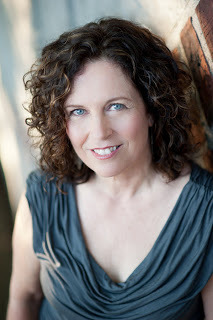

I'd been postponing with the photographer all three weeks as bruises turned purple, green, then yellow, as road rash scabbed and flaked, as skin beneath came red and angry to the surface. As swelling subsided. As my wounded self regained confidence.
When I was a tiny kid, two, three-ish, I became desperately frightened of cameras, of the flash bulbs, particularly. All photos of me from that era show me screaming and red-faced, teary eyed and snot nosed, holding my arms over my face as though the camera is going to explode in it.
By five I seemed to have recovered and marched joyously to the little seat in front of the big standing camera for my kindergarten shot. I was wearing a dress I loved, blue with white and red polka dots, and at the last minute I decided my pixie bangs would look far more stylish swept to the side. The photo turned out darn cute, but my mom was not happy with my impromptu hairstyling.
I became increasingly self conscious in school photos, as adolescents do, but by the time it was senior picture time, I was determined to look sexy and serious, grown up. All things I was not. Unbeknownst to me, I'd eaten tainted chicken at a friend's house the week before and was in the beginning throes of salmonella, which accounts for the sweaty pale face, but even that was okay because I was wearing my denim halter dress. Or rather my sister's denim halter dress. I mostly filled it out.
When we got the proofs (which took about as long back then as it did for the salmonella to have its evil way with me before retreating), I chose the one I loved: me, sitting in the grass, leaning back on one elbow, nostrils flared, not smiling, but dead sexy. My pasty complexion was camouflaged by the filtered light of tree leaves.
My mother hated it. "This one looks like you," she said, indicating the goofiest of the bunch, me with a big toothy smile, full face, my hair all weird, the sexiness of the dress cropped out. "You can have the one you want for the yearbook, but I'm ordering this one to hang on the wall."
Of course, when the yearbook came out, guess which photo appeared. I was crushed. I'd so desperately wanted to look like someone I was not. Thus began an adulthood of hating photos of myself, of being too critical, of stiffening up so much in front of them that I did that weird snarl-smile thing that Chandler did on Friends in the episode about his not being photogenic.
And now I need to have photos taken regularly, because that is what authors do, for book jackets and websites. I had to figure out how to smile in front of a camera, just a natural smile, just a friendly face for readers to connect with. And this is what occurred to me, finally. We are beautiful to those we love (as they are to us). So I started looking into camera lenses as though I was looking into the eyes of someone I loved, smiling at them they way I would upon seeing them for the first time in a long time.
Hello, I think, looking into the lens. I love you. It's so good to see you.

Published on August 15, 2012 18:03
July 15, 2012
Grace
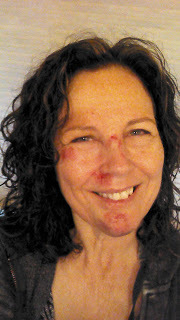 It’s not pleasant to fall as an adult. Let me just say that at the outset. I have tripped a few times over the past few years, say over a curb or uneven sidewalk, and gone to the ground, grazing my hands and knees on gritty concrete, the raw sting an admonishment to watch what the hell I’m doing. Mostly, my ego is the thing that takes the worst beating.
It’s not pleasant to fall as an adult. Let me just say that at the outset. I have tripped a few times over the past few years, say over a curb or uneven sidewalk, and gone to the ground, grazing my hands and knees on gritty concrete, the raw sting an admonishment to watch what the hell I’m doing. Mostly, my ego is the thing that takes the worst beating.Not now. Now that I know what it is to dive head first down concrete steps, hands full so I take the brunt of it with my face? Now I have no ego. I am washed clean of it by blood and gravel and more blood and fear and picking myself up to walk crying down a busy street (no cars stopping, not even though my two hands were pooled with blood), turning right, walking up that street toward friendly neighbors’, watching them try to figure out who I was though they know me quite well, then everyone, more neighbors, some I know, some I don’t, rushing to lie me down, to run for ice and wash cloths and clean water and shushing and cooing and cleaning and touching, and me crying, sobbing, trying to feel with my tongue if my teeth were all there. “I’m sorry,” I kept saying, and they’d shush me some more. “Thank you,” I kept saying, and I’ve never meant it as much.
Thank you world. Thank you for kind people, for resilient bones (women, take your calcium), for efficient funny ER nurses, and for these ugly abrasions and contusions that mean I am alive, and that I have survived everything, so far, that life has thrown at me.
Published on July 15, 2012 09:57
June 6, 2012
When a Wheel Comes Off
Sister S and I woke at dawn on Friday to catch our flight with sister C to visit our youngest sister, T. But before we even left for the airport, C called, sounding cruddy. "I've been up all night," she moaned. "I'm sick. I can't go." We tried but couldn't book a later flight for her; everything was full. And after six months of planning! So S and I went anyway, but it felt all wrong.
 We were a little red wagon with one wheel missing. The four of us have been together in life for over 50 years now, and were heading to Florida to celebrate that fact, it being the year of T's 50th birthday. But without C, we wobbled.
We were a little red wagon with one wheel missing. The four of us have been together in life for over 50 years now, and were heading to Florida to celebrate that fact, it being the year of T's 50th birthday. But without C, we wobbled.
When S, T and I met up at the hotel, we collectively fretted. Should we have rescheduled? When we canceled her flight, should we have kept the return flight, in case she could make it later? We walked on the beach, had drinks by the pool, went out for dinner, but it felt as if we were cheating on her, somehow. "C would love this," we said at the beach drum circle, at the warm turquoise rise of the sea. C has always been our Sister of the Outrageous, in word and adventure, our party starter. Without her, we were a little on the quiet side.
Like most sisters, we have our issues and grievances, old wounds and irritations. We've had fights and riffs and snits, but even so, that's how we are together and we seem to have found a way to be ourselves now, inside of all that, and to accept each other. Ours may be an imperfect container with a few cracks and bumps, a little plastering over in spots, but still, we it's ours. We're as familiar with each other's pet peeves and needs and quirks as we are our own. We know that S will need naps and T will have difficulty making decisions, and I will be bossy, among many other annoying behaviors I've accumulated in life, but without C's off-color language in, say, a restaurant, it just wouldn't be right.
Within hours, she'd booked a flight for the next day, hoping she'd feel well enough to make it. She would arrive at 9 pm or so. "Don't wait for dinner," she said, though we wanted to. So, after our dinner out, the three of us went shopping, procuring C's favorite beer—Corona with lime—then headed back to the hotel to wait for her. As her arrival time drew closer, we called room service.
 When she arrived, you'd have thought she'd come back from the dead. "C's here!" we exclaimed, rushing out into the hallway. "We have beer! And a cheeseburger and fries!" Paltry offerings for her first night in Florida, but C didn't care that she'd missed anything. She just seemed happy to be squished into our hotel room, the three of us watching her eat and talking about what we'd seen and done that day, what we could see and do the next.
When she arrived, you'd have thought she'd come back from the dead. "C's here!" we exclaimed, rushing out into the hallway. "We have beer! And a cheeseburger and fries!" Paltry offerings for her first night in Florida, but C didn't care that she'd missed anything. She just seemed happy to be squished into our hotel room, the three of us watching her eat and talking about what we'd seen and done that day, what we could see and do the next.
We clinked beers and breathed a collective sigh of relief, all of us. Now we could get this party started.
 We were a little red wagon with one wheel missing. The four of us have been together in life for over 50 years now, and were heading to Florida to celebrate that fact, it being the year of T's 50th birthday. But without C, we wobbled.
We were a little red wagon with one wheel missing. The four of us have been together in life for over 50 years now, and were heading to Florida to celebrate that fact, it being the year of T's 50th birthday. But without C, we wobbled. When S, T and I met up at the hotel, we collectively fretted. Should we have rescheduled? When we canceled her flight, should we have kept the return flight, in case she could make it later? We walked on the beach, had drinks by the pool, went out for dinner, but it felt as if we were cheating on her, somehow. "C would love this," we said at the beach drum circle, at the warm turquoise rise of the sea. C has always been our Sister of the Outrageous, in word and adventure, our party starter. Without her, we were a little on the quiet side.
Like most sisters, we have our issues and grievances, old wounds and irritations. We've had fights and riffs and snits, but even so, that's how we are together and we seem to have found a way to be ourselves now, inside of all that, and to accept each other. Ours may be an imperfect container with a few cracks and bumps, a little plastering over in spots, but still, we it's ours. We're as familiar with each other's pet peeves and needs and quirks as we are our own. We know that S will need naps and T will have difficulty making decisions, and I will be bossy, among many other annoying behaviors I've accumulated in life, but without C's off-color language in, say, a restaurant, it just wouldn't be right.
Within hours, she'd booked a flight for the next day, hoping she'd feel well enough to make it. She would arrive at 9 pm or so. "Don't wait for dinner," she said, though we wanted to. So, after our dinner out, the three of us went shopping, procuring C's favorite beer—Corona with lime—then headed back to the hotel to wait for her. As her arrival time drew closer, we called room service.
 When she arrived, you'd have thought she'd come back from the dead. "C's here!" we exclaimed, rushing out into the hallway. "We have beer! And a cheeseburger and fries!" Paltry offerings for her first night in Florida, but C didn't care that she'd missed anything. She just seemed happy to be squished into our hotel room, the three of us watching her eat and talking about what we'd seen and done that day, what we could see and do the next.
When she arrived, you'd have thought she'd come back from the dead. "C's here!" we exclaimed, rushing out into the hallway. "We have beer! And a cheeseburger and fries!" Paltry offerings for her first night in Florida, but C didn't care that she'd missed anything. She just seemed happy to be squished into our hotel room, the three of us watching her eat and talking about what we'd seen and done that day, what we could see and do the next. We clinked beers and breathed a collective sigh of relief, all of us. Now we could get this party started.
Published on June 06, 2012 19:41
March 29, 2012
Heaven for Women Writers
As posted today by the good folks at Open Road Media Group, publisher of Hotel Angeline: A Novel in 36 Voices, a collaborative novel by the members of Seattle7Writers (my peeps).
Hedgebrook, a Women's Writing Community—Advantage, Female Editor's Note: Author Jennie Shortridge (When She Flew and other novels) speaks out on behalf of Women's History Month . Jennie is a co-curator and contributor behind the epic, inventive novel Hotel Angeline: A Novel in 36 Voices and a co-founder of the Seattle7Writers.
 The conversation over wine in our seriously awesome (and mixed gender) Seattle7Writers group might go like this:
The conversation over wine in our seriously awesome (and mixed gender) Seattle7Writers group might go like this:Female writer: "I just got back from Hedgebrook and it was incredible."
Male writer: "Oh god, here we go . . ."Another female writer: "Oh, I've always wanted to go! I need to apply next year."
A third female writer: "It was the best writing experience of my life!" Male writer: "Why do women get a whole writers' retreat to themselves? It's 2012, for crying out loud."
Yes, he's jealous. Hedgebrook on nearby Whidbey Island is indeed a writing retreat and community for women only. It opened in 1987 under the direction and vision of Nancy Nordhoff and Sheryl Feldman. Hedgebrook provides six sweet, small, well-appointed cabins; forty acres of forest and farmland to wander; a rugged beach nearby; and a farmhouse kitchen for delectable family-style suppers using local Northwest ingredients. Each participant shares all this with five other women and can talk about writing together. In a word? It's heaven. And to those female residents from around the world who are chosen from the ever-growing pool of applicants, it's free.
Why women only? While the founders and staff feel a personal passion for supporting women writers in this very generous way, I know that others think our society should be beyond that by now. Women in 2012, after all, have taken their place alongside men in the working world (um, still for less pay), in the political world (in numbers still slim), and in the arts (again, still for less pay in most cases, and in terms of reviews and attention, nowhere near equal).
But that's only part of the conundrum facing women in the creative arts. Forget that we don't get the reviews and attention, the larger advances. We're used to all that, as much as we continue to work to change it. What we don't get in life (as many women will agree) is a wife! What we don't get is someone who anticipates our needs well enough to leave our minds open to creative pursuit (though well-meaning partners often try). We still nurture and nourish our loved ones, fitting in our writing around them, and often a job to boot. It's not in our biological makeup to ignore the needs of others, thus making it only our fault that we put our creative endeavors aside to help.
And that, Virginia, is why I believe in Hedgebrook.
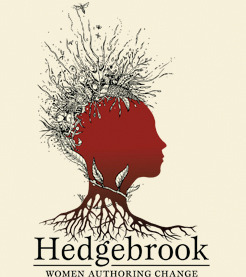 At Hedgebrook, your small cabin has just enough of everything to maximize comfort and minimize housework: one plate, one bowl, one coffee mug, one wine glass, one pan . . . and yet the resident writers are also challenged to use a small wood stove for heat (with supplemental heat available), to visit a bathhouse for bathing (heated tile floors, two roomy showers, a clawfoot tub—it's hardly a challenge), and to integrate with the natural world in so doing, walking from cabin through thick forest along old animal trails, often in complete darkness. And when it gets dark on Whidbey Island, it can feel like being in the center of a black hole for city slickers. (Yes, flashlights are provided, as are toilets and sinks in each cabin.) In the journals that record each resident's experience, found in each cabin, the stories are rife with newbie anxieties and missteps, but more so, the final reflective thoughts on these writers' last days at Hedgebrook. Even experienced and famous writers discover what it was they came for, whether they knew they were looking for it or not. In real life, women rarely get the time and space to even think in those terms.
At Hedgebrook, your small cabin has just enough of everything to maximize comfort and minimize housework: one plate, one bowl, one coffee mug, one wine glass, one pan . . . and yet the resident writers are also challenged to use a small wood stove for heat (with supplemental heat available), to visit a bathhouse for bathing (heated tile floors, two roomy showers, a clawfoot tub—it's hardly a challenge), and to integrate with the natural world in so doing, walking from cabin through thick forest along old animal trails, often in complete darkness. And when it gets dark on Whidbey Island, it can feel like being in the center of a black hole for city slickers. (Yes, flashlights are provided, as are toilets and sinks in each cabin.) In the journals that record each resident's experience, found in each cabin, the stories are rife with newbie anxieties and missteps, but more so, the final reflective thoughts on these writers' last days at Hedgebrook. Even experienced and famous writers discover what it was they came for, whether they knew they were looking for it or not. In real life, women rarely get the time and space to even think in those terms.For me, the thing I didn't know I went looking for was myself—my own authentic voice in my work, after nearly seventeen years of working in the world of "what it takes to get published." It wasn't that it wasn't there, but my trust in it had grown shaky. The publishing world is a tough place to maintain your own creative vision, but if you don't, why write? It came to me in so many small details at Hedgebrook: the way light broke through tall trees to spill across my desk, a cold wind-snapping walk on the beach in search of sand dollars, the laughter and wisdom of the other women in the room at supper. And finally, the two does who stood outside my cabin on the snowy morning I had to leave, just watching me with big deer eyes, saying, "Pay attention. Take this with you."
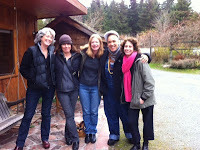 It's a gift everyone should receive, regardless of gender, of course. But I'll revel in the fact that because I'm a woman who takes my writing seriously, Hedgebrook gave it to me.
It's a gift everyone should receive, regardless of gender, of course. But I'll revel in the fact that because I'm a woman who takes my writing seriously, Hedgebrook gave it to me.
Published on March 29, 2012 09:05
March 2, 2012
They Noticed
Posted today by the Open Road Integrated Media Group Blog in honor of Women's History Month:
Though I always yearned for a male teacher's attention (and developed a few crushes along the way), it was the female teachers who took notice of me, of my writing, and who helped me know that I was smart and had something to say. In the late 1960s, my family moved away from Washington DC and its racial unrest, and the horrible collection of assassinations that changed us forever (much as 9/11 has done for this generation). We landed in the safe suburbs of Denver, where the skies were always blue and the sun always shone. And the people were mostly one color: the same color as us. We didn't move because we were racist, but because my parents were weary of the violence and turmoil.
I entered Miss Toeppen's fifth grade class in January, an over-dressed newcomer from back east. I talked funny, I wore dresses in the land of jeans, and I thought about things a bit differently than the other kids. During creative writing time, I feverishly wrote stories about the world I'd left behind: poor black parents in food lines, interracial couples being harassed by strangers, a kid being gunned down in a riot. Miss Toeppen, new to teaching at 22 and as open-hearted and soft as they come, was bowled over. The rest of the students wrote about sports or pets or vacations, and wrote grudgingly at that. I never wanted to stop. She took me aside one day, sat me down, looked straight into my eyes and said, "You're stories are good, you know that, right?"
In junior high, we were assigned to write a long story about anything we wanted to. Not a short story, a long story, and I'd never been so excited. I'd fallen into a group of kids who, like me, were highly unsupervised and dealing with a few issues at home. We smoked pot and cigarettes, and drank whatever we could get our hands on. As new, more exciting drugs came along, we experimented freely. We worked hard to both pretend that we were grown up and to escape the world of grownups we knew. I wrote a drug and alcohol filled tragedy based on my previous summer, calling it fiction, and turned it in, all 100 pages of it (names changed to protect the not-so-innocent). Sure, I was nervous that my English teacher, Mrs. Deutsch, would "narc" on me and I'd be in big trouble, but it was the 70s and the counter-culture had permeated even the suburbs. When it came time to get the graded stories back, she asked us to come up individually as she called our names. Mine was last, and the bell had rung; all the other students were gone. She handed my story to me and said, "This was very interesting." It had an A++ on the front page. She seemed to be waiting for me to say something. When I didn't, she smiled. "Good job," she said. "Really good job."
Parents now might faint at the thought that a teacher wouldn't hand the story over to the principal or worse, my parents. But because I knew she knew it wasn't fiction, I learned that she trusted me to grow up and learn from this harrowing experience, which was exactly what I did. Perhaps that was in the text or subtext of the story, I don't know, but again, she made me feel like a writer, a real writer. And yes, I still felt like an outsider, all these years later, but I realized that's what a lot of people I admired felt like: writers and poets, artists and activists. I recognized Miss Deutsch as a fellow outsider, in her Bohemian ways and "cool" way of handling my story.
In high school, I once again found my way into a creative writing class led by an outlandish, eccentric woman, Ms. Green, who regaled us with her wild thoughts, laughed loudly, and encouraged us to write something unique, something deep, something true. I fed her story after story, poem after poem, and she was always hungry for more. She read our work at her desk, her chair tipped back a little and an index finger on her lip, her hair large and untamed, murmuring, "Mmm, mmm," at our words, sometimes getting tears in her eyes. She noticed us; she felt what we felt. And she let us know.
I teach writing now, to adults and kids. I try to read their work like that, to get inside the writer's skin and understand her or his intention. I try to let them know how important their stories are. And yes, I read a lot of hard and harrowing stories, obviously based on the writer's experiences. And I try to trust that by witnessing their words, by hearing what they have to say, I'm helping them know that by writing, they, too, will get through the hard stuff.
Published on March 02, 2012 14:15
January 31, 2012
The Anti-Snark
(Channeling Andy Rooney)
You know, I don't like this thing called snark. I know it's supposed to be de rigueur (wait, would Andy have said "de rigueur"?) to be cutting, condescending and mean in everything from TV commercials to book reviews (to political sound bites to Facebook posts to normal everyday conversation), but I always think of the old idiom: "You can catch a lot more flies with honey than with vinegar." It's served me well, anyway.
Not that I want to catch any flies, or sugar-coat anything. And not that I can't be gossipy and say something absolutely shitty about someone, particularly if they've pissed me off, but only in the company of one or two really good friends who know I'm mostly nice. I choose not to write it down and put it out in the world, because I know it's not the truth. It may be my truth, for about ten minutes, but that kind of vitriol, that speech that comes from anger or low self esteem or woundedness, damages all of us. It unravels our society, thread by thread, by making it okay to say shitty stuff. But it's not okay. So, as a writer, I choose not to put mean or negative words out into the zeitgeist (which is so full of it at this point in time, anyway, that mine would get lost. But that's not the point.)
The point is:
"A writer's job is to tell the truth." Andy Rooney said that. The truth is important, not opinion. The Internet and reality TV have brainwashed everyone into thinking their opinions are overly important and ought to be shared, loudly, in bold face. "But I have the right to free speech!" some snark might say, or "I'm just saying it's my opinion!"
And I'm saying, your opinion doesn't count. The truth counts. Tell the truth of the matter, of the situation or emotion, of your feelings about the topic, and then I'll stop complaining.
And if you find something I've written somewhere that is mean, condescending or snarky, well. As Andy said, "The average dog is a nicer person that the average person." I try my best.

You know, I don't like this thing called snark. I know it's supposed to be de rigueur (wait, would Andy have said "de rigueur"?) to be cutting, condescending and mean in everything from TV commercials to book reviews (to political sound bites to Facebook posts to normal everyday conversation), but I always think of the old idiom: "You can catch a lot more flies with honey than with vinegar." It's served me well, anyway.
Not that I want to catch any flies, or sugar-coat anything. And not that I can't be gossipy and say something absolutely shitty about someone, particularly if they've pissed me off, but only in the company of one or two really good friends who know I'm mostly nice. I choose not to write it down and put it out in the world, because I know it's not the truth. It may be my truth, for about ten minutes, but that kind of vitriol, that speech that comes from anger or low self esteem or woundedness, damages all of us. It unravels our society, thread by thread, by making it okay to say shitty stuff. But it's not okay. So, as a writer, I choose not to put mean or negative words out into the zeitgeist (which is so full of it at this point in time, anyway, that mine would get lost. But that's not the point.)
The point is:
"A writer's job is to tell the truth." Andy Rooney said that. The truth is important, not opinion. The Internet and reality TV have brainwashed everyone into thinking their opinions are overly important and ought to be shared, loudly, in bold face. "But I have the right to free speech!" some snark might say, or "I'm just saying it's my opinion!"
And I'm saying, your opinion doesn't count. The truth counts. Tell the truth of the matter, of the situation or emotion, of your feelings about the topic, and then I'll stop complaining.
And if you find something I've written somewhere that is mean, condescending or snarky, well. As Andy said, "The average dog is a nicer person that the average person." I try my best.
Published on January 31, 2012 13:12
January 25, 2012
Life Cycle
The change is so sudden it's almost uncomfortable. For weeks, months, (years?), life has been coming at me in waves: waves of projects, waves of people, waves of huge goals to accomplish, small tasks going undone. I crave quiet, alone time. I want the world to turn off. Suspended animation would be nice.
And then, it all drops away. My book is done. The holidays are over. The snow has melted. The guests have gone, and taken my husband with them. The cat remains, but she's been jaded by not enough attention and barely needs me. I am free! I tell myself. Free to do anything I want!
Day 1: I accomplish most small chores ignored too long. I celebrate with a home-cooked gourmet dinner for one, including my favorite cocktail, a sake-tini with cucumber. This is living, all right.
Day 2: I nap. I read. I nap. I read. I nap. At 5:30 I realize I haven't brushed my teeth. I decide to wait until bedtime. Why waste toothpaste now? No one has to see or smell me.
Day 3: I try to read a new book, having finished the old one. It bores me. So I think. A lot. About Everything. Ad infinitum and nauseum.
Day 4: I'm bored. TV is stupid. I eat strange things, like crackers with cream cheese and jelly, and steamed cauliflower.
Day 5: I think of all the things I was going to do this week: revamp my workout plan, clean my office, do taxes. I shudder at the thought of any of those things. I make as many social plans as possible.
Day 6: I go out into the world, coffeeing, lunching, cocktailing, dinnering. By the end of it all, I crave quiet alone time.
Day 7: My husband comes home (and I've never been so glad to see him). I'm asked to participate on a project. I realize other projects are now screaming for my attention. And the next book? I need to start thinking about that . . .
Such is the life cycle of a person who sits centered on the dividing line of the Meyer Briggs Introvert/Extrovert scale. It is what it is.
What is there to do, but begin again?
And then, it all drops away. My book is done. The holidays are over. The snow has melted. The guests have gone, and taken my husband with them. The cat remains, but she's been jaded by not enough attention and barely needs me. I am free! I tell myself. Free to do anything I want!
Day 1: I accomplish most small chores ignored too long. I celebrate with a home-cooked gourmet dinner for one, including my favorite cocktail, a sake-tini with cucumber. This is living, all right.
Day 2: I nap. I read. I nap. I read. I nap. At 5:30 I realize I haven't brushed my teeth. I decide to wait until bedtime. Why waste toothpaste now? No one has to see or smell me.
Day 3: I try to read a new book, having finished the old one. It bores me. So I think. A lot. About Everything. Ad infinitum and nauseum.
Day 4: I'm bored. TV is stupid. I eat strange things, like crackers with cream cheese and jelly, and steamed cauliflower.
Day 5: I think of all the things I was going to do this week: revamp my workout plan, clean my office, do taxes. I shudder at the thought of any of those things. I make as many social plans as possible.
Day 6: I go out into the world, coffeeing, lunching, cocktailing, dinnering. By the end of it all, I crave quiet alone time.
Day 7: My husband comes home (and I've never been so glad to see him). I'm asked to participate on a project. I realize other projects are now screaming for my attention. And the next book? I need to start thinking about that . . .
Such is the life cycle of a person who sits centered on the dividing line of the Meyer Briggs Introvert/Extrovert scale. It is what it is.
What is there to do, but begin again?
Published on January 25, 2012 09:58
December 30, 2011
Snowflakes
Sometimes you just want to close your eyes and ears to the predictable crapola media dishes out, don't you? All of the "Year in Review" lists are whirling around, listing the same stuff, over and over, like it's all pre-ordained and we've all decided, "Yes, THESE were the best movies, books, songs, moments." But how can that be? We're snowflakes, people, no two of us alike.
So, naturally, I've been thinking about my favorites, things that resonate still, after months or weeks, things that didn't just fly through my noggin making a brief stop to blast me with special effects or trendy "it" themes or manipulative sentiments.
These are my favorites of 2011.
Favorite movie: Circo, a gorgeous look at a family under the immense pressure of running a family circus in Mexico. Watch the kids, especially. They're spectacular and sad and strong. Resilience in motion.
Favorite TV show: Louie. I love this show, and I don't love TV. Profane at times, and almost always honest. The first time my husband and I watched it, we thought, fine, another comedy, and at the end we were saying, "Whoa. That's dark. But . . . awesomely dark." I don't know why I love it. I just do.
Favorite book: Okay, there's no way I'm going to tell you my favorite book, because too many of my friends write them. I did enjoy getting immersed in State of Wonder by Ann Patchett this year. It wasn't perfect, but few books are, and she kept me engaged. As someone who has a hard time reading fiction these days without seeing the scaffolding, that means a lot.
Favorite music: Fine, I'm predictable on this one, but can I help it that I love Adele? I got to see her perform this year, which seals the deal. She's the real thing, big soulful honest heartache. And then she giggles and says something wacky in her Cockney accent, and you have to love her even more.
Favorite moment: Now, on the verge of letting the year go, looking back, bittersweet and ready to move ahead.
Tell me your favorites . . .
And happy brand new year, everyone.
So, naturally, I've been thinking about my favorites, things that resonate still, after months or weeks, things that didn't just fly through my noggin making a brief stop to blast me with special effects or trendy "it" themes or manipulative sentiments.
These are my favorites of 2011.
Favorite movie: Circo, a gorgeous look at a family under the immense pressure of running a family circus in Mexico. Watch the kids, especially. They're spectacular and sad and strong. Resilience in motion.
Favorite TV show: Louie. I love this show, and I don't love TV. Profane at times, and almost always honest. The first time my husband and I watched it, we thought, fine, another comedy, and at the end we were saying, "Whoa. That's dark. But . . . awesomely dark." I don't know why I love it. I just do.
Favorite book: Okay, there's no way I'm going to tell you my favorite book, because too many of my friends write them. I did enjoy getting immersed in State of Wonder by Ann Patchett this year. It wasn't perfect, but few books are, and she kept me engaged. As someone who has a hard time reading fiction these days without seeing the scaffolding, that means a lot.
Favorite music: Fine, I'm predictable on this one, but can I help it that I love Adele? I got to see her perform this year, which seals the deal. She's the real thing, big soulful honest heartache. And then she giggles and says something wacky in her Cockney accent, and you have to love her even more.
Favorite moment: Now, on the verge of letting the year go, looking back, bittersweet and ready to move ahead.
Tell me your favorites . . .
And happy brand new year, everyone.
Published on December 30, 2011 18:36



